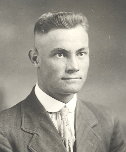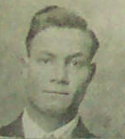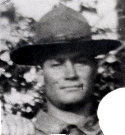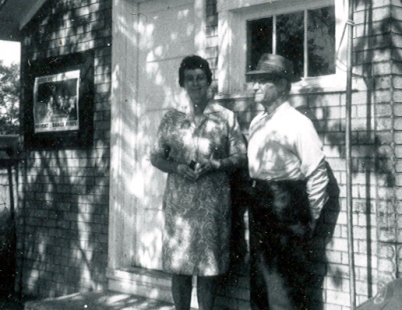
 David M. Paskett was born on January 14, 1896, in a five room log cabin with a dirt roof. He was the fourth child of ten children born to William Pope Paskett and Annie Mecham. When David was about four or five years old, his Dad built a two room addition to the five room log cabin. There was a four foot walkway between the log cabin and the addition.
David M. Paskett was born on January 14, 1896, in a five room log cabin with a dirt roof. He was the fourth child of ten children born to William Pope Paskett and Annie Mecham. When David was about four or five years old, his Dad built a two room addition to the five room log cabin. There was a four foot walkway between the log cabin and the addition.
David knew hard work at a very early age. When he was five or six years old he was helping thresh the grain. There were no tractors or steam engines at that time so every thing had to be done with teams of horses.
This particular day, George Richins was the teamster and before he could start threshing he had to drive pegs into the ground with a sledge hammer in order to hold down the mechanism which the six teams of horses were hitched to. The pegs kept the mechanism from tipping over when the horses began to turn it. An iron chip broke off from one of the pegs and hit Dave on the top of the head. He thought he was too big to cry and he just left his hat on but blood was all over his forehead. When his Dad came, Dave had blood all over his head and couldn’t remove his hat. His father told him to go to the house and take care of it.
Dave was nine years old when his father got a job blasting and cutting rock for the Dick Warburton home in Etna. His dad was gone two years and Dave’s older brother, Steve and Fred, were gone working for wages so that left Dave with taking care of the farm.
The first time Dave worked for wages was when he was thirteen years old. His uncle Martin D. Mecham hired him for a dollar a day to help him herd sheep. He said at this time in his life he learned how to make sourdough bread.
When he was fourteen years old, he went to work for George with the sheep. When he was fifteen he went to work for Allen Tanner at what was then the Thomas Ranch at the north end of Grouse Creek. His early responsibilities on the farm had taught him many things other kids had not yet learned so he was a great help in teaching other kids. He stayed on all summer with Allen and helped with the haying and all.
When he was sixteen years old he went to work for George Carson, again herding sheep. He worked with another kid by the name of Thad Edwards who was his herder. Dave was the cook and he tells of an incident about one day when a thunder storm came up. When Dave opened the door in the camp stove to put in some bread a lightning bolt hit in front of the camp wagon and a big flame shot out of the stove. He was knocked out from 8:00 a.m. until about 11:00 a.m. When he woke up, he saw the bread upside down on the floor. He accused Thad of putting gun powder in the fire. He wasn’t aware lightning had hit until he saw the big hole it made in the ground right by the wagon tongue. They had two pups and after the strike one went around crippled for about two weeks and they never did see the other one again.
All during his life, Dave always liked and made sure he went to school. Sometimes he was late in starting but even if it was in December, he always managed to attend all grades of school and received good grades. He enjoyed learning and even went through the eighth grade twice because he liked it so much.
 Dave entered military service when the United States declared war on Germany on April 6, 1917. Like all parents, Dave’s did not want him to go but in February 1918 he received a letter from the Draft Board instructing him to report to Brigham City for his physical examination. His Uncle Phil got real angry with him because he didn’t write back and tell them he was needed on the farm. He and a guy by the name of Albert Davis wanted to enlist but were advised against it because if they did, they would go into the infantry. After a couple of weeks they had some openings in the heavy artillery so they both enlisted and was sent to Denver, Colorado for the rest of the processing.
Dave entered military service when the United States declared war on Germany on April 6, 1917. Like all parents, Dave’s did not want him to go but in February 1918 he received a letter from the Draft Board instructing him to report to Brigham City for his physical examination. His Uncle Phil got real angry with him because he didn’t write back and tell them he was needed on the farm. He and a guy by the name of Albert Davis wanted to enlist but were advised against it because if they did, they would go into the infantry. After a couple of weeks they had some openings in the heavy artillery so they both enlisted and was sent to Denver, Colorado for the rest of the processing.
They were then shipped to Florida where he received his artillery training. After six months of training in Florida he was shipped to New York in preparation for going overseas. They were there long enough for a new issue of clothing then put on a ship headed for England. While they were on the high seas, an English freighter ran into their ship. Because of the damage, their route was changed and he was shipped directly to France. It took them eight days to make the journey. After being in France about a month his company was ordered to the front. They boarded the train but the train never left the station. They waited and received word the war had ended.
They were taken back to camp and eventually received their orders to ship out for home. The ship that brought them home was old and decrepit. They had to take turns pumping water out of the hold, which was the only exercise they had. It took twenty one days to cross the ocean coming home as compared to eight going the other way. He was discharged on March 21, 1919 after thirteen months of duty and he was twenty three years old.
After his tour of duty in the military, he worked for a few months at home with his dad then in the spring of 1920, he got a job with a Mr. Wallace Ward doing general ranch work and breaking horses. When he quit, he took the money he had earned and bought a herd of cattle. He had no sooner bought the cattle than his Bishop asked him to go on a mission. He sent his papers in and was called to the Australian Mission.
While in Salt Lake City shopping for clothes and other stuff for his mission, he went to a store called the Paris Millinery Company. There he first met his future wife Winifred Annie Keith. She was working there with a friend of hers, who knew Dave’s family, and was invited out to dinner.
He traveled with three other missionaries. They arrived in San Francisco where they saw as many sights as they could then when the time came they boarded the ship for Honolulu. It took seven days and he was sick at least half that time. They had a four hour layover in Honolulu where they saw some of the sights and met some elders who were on their way back from Australia. They docked at Sydney, Australia where the missionaries who were there met them at the dock. He knew they were missionaries as he recognized one of them as a Bert Nelson from Junction, Idaho. His training missionary was Elder Marion G. Romney.
Dave had the opportunity of visiting his Aunt Annie while in Brisbane. She had moved there from England when all her family had joined the Mormon Church and she was quite anti-Mormon. They did have some good visits though and Dave was invited almost every week to dinner and visit. Dave spent two and one half years in the mission field and was twenty seven years old when he was released.
When he returned from his mission, he did odd jobs, shearing sheep, herding sheep, and other various jobs for about three years. He rented Orin Richins’s place on shares and raised potatoes. He says he made $20.00 for the summer which he owed to the Oakley store so he ended up making nothing from the farm but while the potatoes were growing, he and his brother Steve worked making a new county road from Oakley part way to Grouse Creek so the summer was not a complete waste.
 Dave’s brother, Steve, kept after him to get married. Dave, his brother Melvin and another bachelor, Edgar Ecklund, were at Declo, Idaho, picking spuds when one night after work they were talking about girls that they might write to just for devilment. Dave had Winifred’s address in California so he decided to write to her. He wasn’t sure she’d even write back but she did and they corresponded quite regularly. After a while he asked her to marry him and she wrote back and said she wouldn’t marry anyone until she was out of debt.
Dave’s brother, Steve, kept after him to get married. Dave, his brother Melvin and another bachelor, Edgar Ecklund, were at Declo, Idaho, picking spuds when one night after work they were talking about girls that they might write to just for devilment. Dave had Winifred’s address in California so he decided to write to her. He wasn’t sure she’d even write back but she did and they corresponded quite regularly. After a while he asked her to marry him and she wrote back and said she wouldn’t marry anyone until she was out of debt.
One day he got a letter from her saying she was out of debt and would be on the train at Burley, Idaho on January 6, 1927 and would he meet her. His brother, Steve, said if Dave would get married, he would pay for the marriage license. So he bought her a ring (which didn’t fit), met her at the train, whisked her over to Bishop Clarence Randall’s home and married her the very same night. Dave and Winifred had four children, three sons, David K, Bill K. and John K; and one daughter, Jean
Dave worked in various towns for various people throughout Idaho before moving to Grouse Creek to have a permanent home. When he moved to Grouse Creek, he bought the Mecham place at the lower end of the Valley and for a while rented the Dave Thomas Ranch. When his younger brothers went to the Army during World War II he also took care of their ranch as well as his own.

Rhea Toyn & David Paskett-1966
After his two oldest boys were out of school and had gone to work for the railroad, he ran the mail job for eight years for George E. Ballingham. When George moved from Grouse Creek, Dave bid on the job and his sons gave him a pickup truck so he could handle it. In the thirty-one years he delivered the mail, he saw the Post Office at Lucin close. The train service was discontinued and Lucin became a Ghost Town.
He retired at the age of eighty and in 1979 his wife, Winifred, had an accident, passed out and fell to the floor, cutting her head quite badly. He took her to the doctor in Tremonton and he advised him to move into town where she would be closer to medical care. Dave was a “dyed in the wool” Grouse Creek man and was reluctant to move but after much persuasion by his kids, in November 1979, he and Winn moved to a small apartment in Roy, where he was close to his daughter, Jean, and his youngest son, John.
Having no chores or anything to do they got active in the Senior Citizens center in Roy, Utah and Dave got interested in tooling leather as a hobby. In 1981 he entered two miniature saddles in a leather show in the Salt Palace in Salt Lake City and took a third place ribbon. This encouraged him and his work created a lot of interest among the visitors at the Center. He spent a lot of time making things for people who requested various articles.
As Winn’s health deteriorated, they moved out of the apartment into a place on Adams street in Ogden where they didn’t have to do their own cooking. Dave kept up with his leather work. His hand became crippled and he finally had to give that up also. After a short while they had to move into a full care center in Roy, Utah, where they spent the remainder of their years.
Winn passed away in December 1988 and was laid to rest at Washington Memorial Heights in Ogden, Utah After her death, Dave’s health really began to decline and on June 10, 1993, at the age of ninety-seven, he passed away and was laid to rest beside his eternal companion on June 15, 1993, leaving a posterity of three sons and one daughter, eighteen grandchildren and forty great-grandchildren.
